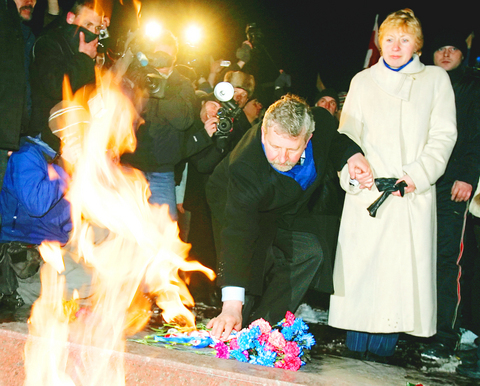Opponents of newly elected President Alexander Lukashenko faced a crucial test of strength yesterday, planning a second protest against a vote the government said had handed the authoritarian incumbent a new five-year term by a massive margin.
Lukashenko, who has ruled with an iron hand since 1994, won a "commanding victory" with 82.6 percent, according to a complete preliminary ballot count, Central Election Commission chief Lidiya Yermoshina said. Main opposition candidate Alexander Milinkevich received 6 percent, she said.
Addressing a crowd of thou-sands waving flags and shouting for freedom in a central Minsk square after polls closed on Sunday, Milinkevich dismissed the vote as a farce and called for "new, honest elections" in the former Soviet republic.

PHOTO: AP
Several thousand people massed in Oktyabrskaya Square, heeding Milinkevich's calls for a peaceful protest and defying a government ban on election day rallies that had raised fears of a potentially violent confrontation.
Milinkevich and the other opposition candidate, Alexander Kozulin, called on supporters to return to the square yesterday evening -- signaling a bid to hold a sustained protest like those that brought opposition leaders to power in other ex-Soviet republics including neighboring Ukraine.
The authorities made no move to disperse protesters on Sunday, but busloads of riot police idling on a nearby street were a silent reminder of the government's threats of a decisive response.
The crowd was the biggest the opposition had mustered in years, reaching at least 10,000, according to reporters' estimates. After about three hours, a smaller group marched to nearby Victory Square, some laying carnations at a monument there before dispersing around midnight.
"Tomorrow we will show the world our might!" said Kozulin, who the elections chief said received 2.3 percent of the vote. He demanded the release of what he said were hundreds of opposition activists detained during a campaign marred by heavy-handed government harassment.
Meanwhile, the EU said yesterday that the presidential election in Belarus was marred by a "climate of intimidation."
Austrian Foreign Minister Ursula Plassnik, whose country holds the EU's rotating presidency, said the opposition in the former Soviet republic "was systematically intimidated" in campaigning for Sunday's presidential elections in which President Alexander Lukashenko was declared the winner with an overwhelming majority.
But the head of the observer mission of a grouping of former Soviet states yesterday called the disputed Belarusian presidential election open and transparent.
Rushailo, in a droning statement that lasted more than a half-hour, said the CIS mission's 467 observers concluded that, despite some technical violations, the Sunday elections took place within the requirements of Belarusian law.

A feud has broken out between the top leaders of the far-right Alternative for Germany (AfD) party on whether to maintain close ties with Russia. The AfD leader Alice Weidel this week slammed planned visits to Russia by some party lawmakers, while coleader Tino Chrupalla voiced a defense of Russian President Vladimir Putin. The unusual split comes at a time when mainstream politicians have accused the anti-immigration AfD of acting as stooges for the Kremlin and even spying for Russia. The row has also erupted in a year in which the AfD is flying high, often polling above the record 20 percent it

Ecuadorans are today to vote on whether to allow the return of foreign military bases and the drafting of a new constitution that could give the country’s president more power. Voters are to decide on the presence of foreign military bases, which have been banned on Ecuadoran soil since 2008. A “yes” vote would likely bring the return of the US military to the Manta air base on the Pacific coast — once a hub for US anti-drug operations. Other questions concern ending public funding for political parties, reducing the number of lawmakers and creating an elected body that would

The latest batch from convicted sex offender Jeffrey Epstein’s e-mails illustrates the extraordinary scope of his contacts with powerful people, ranging from a top Trump adviser to Britain’s ex-prince Andrew. The US House of Representatives is expected to vote this week on trying to force release of evidence gathered on Epstein by law enforcement over the years — including the identities of the men suspected of participating in his alleged sex trafficking ring. However, a slew of e-mails released this week have already opened new windows to the extent of Epstein’s network. These include multiple references to US President Donald

CHARGES: The former president, who maintains his innocence, was sentenced to 27 years and three months in prison for a failed coup bid, as well as an assassination plot Far-right former Brazilian president Jair Bolsonaro is running out of options to avoid prison, after judges on Friday rejected his appeal against a 27-year sentence for a botched coup bid. Bolsonaro lost the 2022 elections and was convicted in September for his efforts to prevent Brazlian President Luiz Inacio Lula da Silva from taking power after the polls. Prosecutors said the scheme — which included plans to assassinate Lula and a top Brazilian Supreme Court judge — failed only due to a lack of support from military top brass. A panel of Supreme Court judges weighing Bolsonaro’s appeal all voted to uphold